Indigo, Explanation, Line by Line and Meaning of Difficult Words, English CBSE Class 12 NCERT Flamingo Chapter 5
INDIGO
(Explanation and meaning of difficult words)
Author – Louis Fischer


| Phrase | Meaning |
| Urge the departure | Ask or insist to go |
| Harbour a man like me | Give shelter to a person like me |
| Conflict of duties | Duties opposite to each other |
| Seek a prop | Request or ask a support |


| Word | Meaning |
| How it happened | The reason, The background |
| Urge the departure | Ask or insist to go |
The author had first gone to meet Gandhiji in 1942. He met him at Sevagram which is located in central India. Gandhiji had told that he would explain to author how he had come to the conclusion to ask British to go from India. It had happened in 1917.


| Word | Meaning |
| Convention | Meeting of large number of people |
| Delegates | Representatives |
Gandhiji had gone to Lucknow in December 1916. It was to attend the yearly meeting of Indian National Congress party. 2301 representative of congress and many visitors had come there.


| Word | Meaning |
| Proceedings | Activities |
| Recounted | Narrated |
| Peasant | Farmer |
| Emaciated | Weak and thin (due to lack of food) |
Gandhiji recalled that while meeting was going on, a farmer came to him. He was looking like any other farmer of India – poor and thin. The farmer told his name – Rajkumar Shukla to Gandhiji. He requested Gandhiji to come to his district – Champaran


| Word | Meaning |
| Foothills | Base of a mountain |
| Towering | Very high |
Gandhiji was hearing name of that place for the first time. Champaran is at the base of a very high mountain Himalayas. It is near Nepal.


| Word | Meaning |
| Sharecropper | A farmer who shares the crop |
| Resolute | Determined |
Farmers of Champaran had to share crop of their field with owners of the field. This was an old arrangement. Rajkumar Shukla was also a sharecropper. He was illiterate but a determined person.


Rajkumar wanted to complain that owners of land were doing injustice to farmers. He had come to the meeting for this reason. Probably somebody had advised him to talk to Gandhiji.


| Word | Meaning |
| Committed | Agreed |
Gandhiji told Shukla that he had an appointment to go to Cawnpore. (This is the old spelling of Kanpur). Gandhiji had already agreed to visit other places in India also. Shukla went with Gandhiji to each place.


| Word | Meaning |
| Beg | Request |
After all his visits, Gandhiji came back to his ashram. His ashram was near Ahmedabad. Shukla also came to ashram. He was with Gandhji for many weeks. He requested Gandhiji to fix a date to visit Champaran.


| Word | Meaning |
| Tenacity | Determination, Persistence |
| Such and such date | On a particular date |
Gandhiji was impressed by the story and determination of Shukla. He said to Shukla that he would be in Calcutta on a particular date. He asked Shukla to meet him there and take him to Champaran from Calcutta.


| Word | Meaning |
| To sit on haunches | To sit on the ground |
| Appointed place | Agreed place |
After many months Gandhji came to Calcutta. Shukla was sitting on the ground at the agreed place to wait for Gandhiji. He waited till Gandhiji was free.


| Word | Meaning |
| Boarded the train | Got into the train |
| Led him | Took him |
Gandhiji and Shukla got into a train. They reached Patna – a city in Bihar. In Patna Shukla took Gandhiji to the house of a lawyer. Name of lawyer was Rajendra Prasad. He later became president of Congress party. After independence he became first president of India.
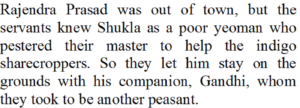

| Word | Meaning |
| Yoeman | A small farmer |
| Pester | To request or bother repeatedly, |
Rajendra Prasad was not in the town. His servants knew that Shukla was a small farmer. They also knew that Shukla used to repeatedly request their master to help indigo sharecroppers. So they allowed him and Gandhiji to stay on the ground. (Means they did not give them a cot or a bed) They assumed that Gandhiji was also a farmer.


But servants did not allow Gandhiji to draw water from the well. They thought that Gandhiji could be an untouchable person. They did not want to pollute all the water of the well. They did not know that Gandhiji was not an untouchable.


| Word | Meaning |
| Enroute | On the way |
| Impart | To give |
Gandhiji wanted to get complete information about sharecropping. He thought that Shukla was not capable to give him complete information. So Gandhiji decided to first go to Muzzafarpur town. This town was on the way to Champaran.


| Word | Meaning |
| Seen at | Met at |
So Gandhiji sent a telegram to Professor J.B. Kriplani. He was a professor at the Arts College in Muzzafarpur. Gandhiji had met him at Shantiniketan School. This school was being run by Rabindra Nath Tagore.


The train reached Muzzafarpur at the midnight of 15th April 1917. Prof. Kriplani was waiting at the station for Gandhiji. A large number of students were also present. At Muzzafarpur, Gandhiji stayed at the house of Prof. Malkani for two days. He was a teacher in a government school.


| Word | Meaning |
| Harbour a man like me | Give shelter to a person like me |
| Smaller localities | Smaller towns |
| Advocates | Supporters |
Gandhiji said that during those days, government professors were not giving shelter to people like him. So it was an extraordinary thing. In smaller towns, Indians were afraid to show sympathy to supporters of home-rule movement.


| Word | Meaning |
| Advent | Arrival |
| Mission | Goal, Objective |
| By conveyances | By vehicles |
| Champion | Leader |
The news of arrival of Gandhiji and his goal spread in whole Muzzafarpur. This news also reached Champaran. Many sharecroppers started coming on foot and in vehicles to meet their leader – Gandhiji.


| Word | Meaning |
| Called on | Met |
| Brief him | To explain to him |
Lawyers of Muzzafarpur met Gandhiji. They explained to him that they were frequently fighting court cases for peasants. They also told him about their cases and the fees they were taking from peasants.


| Word | Meaning |
| Chided | Lectured, Scolded mildly |
| Collecting | Taking |
Gandhiji mildly scolded lawyers for charging huge fees from sharecroppers. He told them that he had come to a conclusion. We should not go to courts of law. Because taking this type of cases to court does not do anything good.


| Word | Meaning |
| Crushed | Exploited |
| Fear stricken | Frightened, Afraid of |
| Relief | Solution |
Here farmers are exploited. They are frightened. Hence law courts are not useful. The real solution is to make them free of fear.


| Word | Meaning |
| Arable | Suitable for agriculture, Cultivable |
| Large estate | Big property, Large area |
| Tenant | Person who pays rent for using a property |
| Chief | Main |
| Commercial | That can be sold |
In Champaran, most the land suitable for agriculture was divided into large area or large property. Englishman were owners of the land. Indians were working as tenants. The main crop grown and sold was Indigo.


| Word | Meaning |
| Landlords | Owners of land |
| Compelled | Forced |
| Plant | Grow, Cultivate |
| Holding | Property |
| Surrender | Give |
| Harvest | Crop |
Owners of the land forced tenants to grow indigo on 15 percent of their land. This crop was taken by landlords as the rent. There was long term contract for this arrangement.
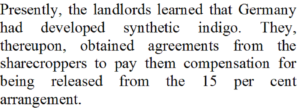

| Word | Meaning |
| Presently | Recently |
| Synthetic | Artificial |
| Thereupon | After that |
| Compensation | Money paid to reduce loss |
| For being released | For freeing |
Recently landlords came to know that artificial indigo had been developed in Germany. So demand of natural indigo had reduced. The crop was not needed. After this, landlords wanted to free the sharecroppers of the 15 percent agreement. But they wanted some money from sharecropper to cancel the agreement.


| Word | Meaning |
| Irksome | Troublesome, Irritating |
| Resisted | Opposed |
| Thugs | Goons, Gundas |
For every peasant, the sharecropping arrangement was irritating and troublesome. So many peasants signed to cancel the agreement. They paid compensation to landlords. Some peasants opposed paying compensations. So they engaged lawyers to fight cases in court. The landlords hired goons to threaten such peasants.


| Word | Meaning |
| Meanwhile | During same time, Meanwhile |
| Illiterate | Uneducated |
| At this point | At this situation |
During the same time, uneducated farmers also came to know about artificial indigo. But they had already signed new agreement and paid compensation to landlords. Now they wanted landlords to return their money. In this situation Gandhiji arrived at Champaran.


Gandhiji started his work by trying to obtain truth. First he met secretary of British landlord’s association. The secretary refused to give any information. He told Gandhiji that he was an outsider. Gandhiji replied that he was not an outsider. Gandhiji did not get any information from him.
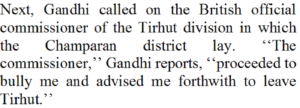

| Word | Meaning |
| Called on | Met |
| Bully | To scold, To threaten |
| Forthwith | Immediately |
After that Gandhiji met commissioner of Tirhut division. Champaran was in the Tirhut division. The commissioner scolded Gandhiji. He advised Gandhiji to immediately leave Tirhut.


| Word | Meaning |
| Proceeded to | Went to |
| Vast | Very big |
| Multitude | Crowd |
Gandhiji did not leave Tirhut. He went to Motihari. It was the capital of Champaran district. Many lawyers went with him. At railway station of Motihari, a large crowd had come to welcome Gandhiji.


| Word | Meaning |
| Headquarter | Main office |
| Investigation | Inquiry |
| Maltreated | Beaten or abused |
He stayed in a house in Motihari. That house became his main office. He continued his inquiry to find facts. A report came to him that a peasant had been beaten in a village.


Gandhiji decided to meet him. Next morning he started for the village on an elephant. He had gone to a small distance. A messenger of police superintendent came to him. He ordered Gandhiji to return to Motihari in his vehicle.


| Word | Meaning |
| Complied | Obeyed |
| Served | Gave |
| Quit | Leave |
Gandhiji obeyed his orders. He came back to Motihari in the vehicle of the messenger. The messenger gave a written order to Gandhiji. The order asked Gandhiji to leave Champaran district immediately. Gandhiji wrote on the copy of the order that he would not obey the order. Signed it and gave to the messenger.


| Word | Meaning |
| Summons | Order from court |
As result of disobeying, Gandhiji was ordered to come to the court next day.


| Word | Meaning |
| Telegraphed | Sent telegram |
| Influential | Prominent, Main |
| Wired | Sent telegram |
| Viceroy | Highest officer in India during British time |
Gandhiji did not sleep that night. He gave telegram to Rajendra Prasad. Gandhiji requested him to come to Motihari with his prominent friends. Gandhiji sent some instruction to his ashram. He sent a report to the Viceroy through telegram.


In the morning large number of peasant had reached Motihari. (In the town everywhere one could see people. Since their hair were black, the town looked filled with black colour). The peasants did not know what Gandhiji had done in South Africa.
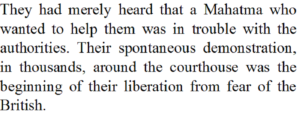

| Word | Meaning |
| Merely | Only |
| Heard | Came to know |
| Spontaneous | Immediate, |
| Demonstration | Display, Presentation |
| Liberation | Freedom |
The peasants had come to know that a Mahatma had come to Motihari. He wanted to help them. But the officers were troubling him. The immediate arrival of peasants in large number was the starting point for their freedom from fear of British.
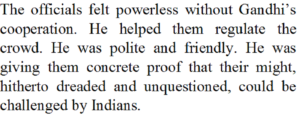

| Word | Meaning |
| Regulate | Control |
| Concrete proof | Solid proof |
| Might | Power, Authority |
| Hitherto | Till this time |
| Dreaded | Feared |
| Unquestioned | Certain |
It was difficult for officers to control the crowd. So they requested help of Gandhiji. He helped officials in controlling the crowd. He remained polite and friendly. Till that time everybody feared the authority of British. Their authority was certain and accepted by everyone without any doubt. Gandhiji gave British officials solid proof that their authority could be challenged by Indians.


| Word | Meaning |
| Baffled | Confused |
| Prosecutor | Lawyer of govt. |
| Apparently | Seemingly |
| Wished | Wanted |
| Consult | Take advice |
| Superiors | Higher officers |
The government was confused. Lawyer of the government requested the judge to postpone the case. It seemed like authorities wanted to take advice of their officers.


Gandhiji objected for delaying the case. He gave a statement in the court saying that he was at fault.


| Word | Meaning |
| Conflict of duties | Duties opposite to each other |
| Render | To perform |
| Humanitarian | As a human being |
Gandhiji told the court he had two opposite duties to fulfil. The first duty was to obey the law. He did not want to break the law and set a bad example. The second duty was to perform service to human beings and to his nation. He had come to Champaran for this duty.


| Word | Meaning |
| Disregard | Disobey, Neglect |
| Not for want of respect | Not to insult |
| Conscience | Inner voice of self |
He did not want to insult the lawful authority by disobeying order to leave Champaran. But he was obeying his inner voice, which is a much higher law. He requested the court to punish him.


| Word | Meaning |
| Pronounce | Declare |
| Sentence | Punishment |
| Recess | Break |
| Furnish | Submit |
| Bail | Guarantee |
The magistrate announced that he will declare the punishment after a break of two hours. He asked Gandhiji to submit a bail for the time of recess. Gandhiji declined to submit the bail. And judge released him without bail for the duration of two hours.


| Word | Meaning |
| Reconvened | Restarted |
| Deliver | Give |
When the court restarted, the judge did not give his judgement. He said that he would give judgement after many day. He allowed Gandhiji to remain free till that time.
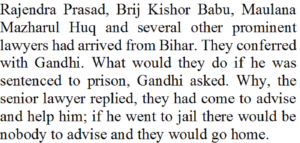

| Word | Meaning |
| Conferred | Discussed |
| Prominent | Main, Influential |
Many influential lawyers had come from Bihar. Gandhiji had a discussion with them. Gandhiji asked them what they would do if he were sent to jail. They replied that they had come to help Gandhiji. If Gandhiji went to jail, they would go to their homes.


Gandhiji asked them what they would do about the injustice to the sharecroppers. All the lawyers separately had a discussion among themselves.
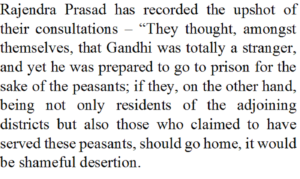

| Word | Meaning |
| Upshot | Conclusion, Result |
| Consultation | Discussion |
| For the sake of | For the benefit of |
| Adjoining | Nearby |
| Desertion | Betrayal, Leaving |
Rajendra Prasad has recorded the conclusion of their discussions. They thought that Gandhiji was ready to go to prison for the benefit of farmers though he had come from outside. While they all were from nearby districts. They were also claiming that they were helping the farmers. In this situation if they went home, it would be a shame on them and they would be deceiving farmers.


After their discussion, they went to Gandhiji. They told him that they were ready to go to the jail with him. Gandhiji then expressed that that battle of Champaran was won.


| Word | Meaning |
| Put down | Write |
| Court arrest | Voluntarily get arrested in court |
Then Gandhiji made groups of them. He wrote their names group wise on the paper. He made a sequence of the groups in which they will ask court to arrest them.
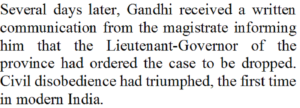

| Word | Meaning |
| Communication | Message |
| Lieutenant Governor | An officer of British era |
| Province | State |
| Case to be dropped | Withdraw, take back or close the case |
After many days Gandhiji received a letter from the judge. It informed him that the Lieutenant Governor had given orders to close the case. This was the first victory of Civil Disobedience in modern India.


| Word | Meaning |
| Proceeded | Continued |
| Far flung | Detailed, In detail |
| Grievances | Problems, Complaints |
| Deposition | Written statement |
| Evidence | Proof |
Gandhiji and lawyers continued their detailed inquiry about complaints of farmers. They wrote written statements of about ten thousand farmers. They made their own notes about other proofs.


| Word | Meaning |
| Throbbed | Full of |
| Vehement | Intense, Strong |
| Protest | Objection, Opposition |
They collected many documents. The whole area was full of activities of investigators. There were strong opposition from landlords.


| Word | Meaning |
| Summoned | Called |
| Leading associates | Main colleagues |
Sir Edward Gait was the Lieutenant Governor. He called Gandhiji to his office. Before going to meet him, Gandhiji met his main colleagues. Gandhiji made a detailed plan about what they should do if he was arrested. It was another round of civil disobedience.
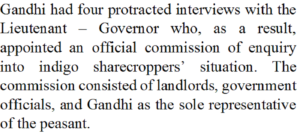

| Word | Meaning |
| Protracted | Lengthy |
| Interviews | Discussions |
| Sole | Only one |
Gandhiji had four lengthy discussion with Lieutenant Governor. The LG appointed a commission to conduct an inquiry about situation of sharecroppers. Members of the commission were landlords, government officials and Gandhiji. Only one representative from the side of farmers was Gandhiji.


| Word | Meaning |
| Remained | Stayed |
| Uninterrupted | Continuous, Witout break |
Gandhiji initially stayed in Champaran continuously for seven months. After that he visited Champaran many times for shorter duration.


| Word | Meaning |
| Casually | Informally, Without commitment |
| Entreaty | Request |
| Unlettered | Illiterate |
| Occupied | Engaged |
The first visit of Gandhiji was on the request of an uneducated farmer. Gandhiji had not committed anything to the farmer. He had made that visit informally. He had expected that the visit would be for some days. But it engaged him for about a year.


| Word | Meaning |
| Assembled | Gathered |
| Crushing mountain | Very large |
| Refund | Return |
The enquiry commission gathered large amount of proofs. These proofs were against the landlords. When landlords saw these proofs, they agreed to return money to farmers. They asked Gandhiji that how much money they should return.


| Word | Meaning |
| Repayment | Refund |
| Illegally | Without any law |
| Deceitfully | Wrongly, By cheating |
| Extorted | Forcefully taken, Extracted |
Landlords thought that Gandhiji would demand to refund the total amount. This amount they had forcefully taken without any law by cheating sharecroppers. But Gandhiji asked to refund only half of the amount.


| Word | Meaning |
| Adamant | Rigid, Determined |
| Reverend | A title of a priest |
| Missionary | Person who preaches Christianity |
| Episode | Incident, Event |
| Close range | In detail, From very near |
Reverend J.Z. Hodge was a person living in Champaran for preaching Christianity. He was observing the full incident in details. He had written that Gandhiji appeared rigid about refund of 50 percent of the amount.


| Word | Meaning |
| Give way | Agree |
| Amazement | Surprise |
| Deadlock | Disagreement |
| Took him at his words | Accept |
Representative of landlords offered to refund 25% of the amount. He probably thought that Gandhiji would not agree to this small refund. But to his surprise, Gandhiji accepted the offer. Thus the disagreement was removed.
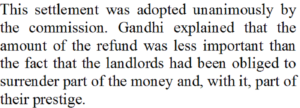

| Word | Meaning |
| Settlement | Agreement |
| Adopted | Accepted |
| Unanimously | By everyone |
| Obliged | Forced to agree |
The agreement was accepted by every member of the commission. Gandhiji explained that through this agreement, landlords were forced give some money and their prestige. According to him this was more important that the amount of refund.


Earlier farmers were convinced that landlords were behaving as if they were above the law. [Meaning that whatever they said was the law. No action could be taken against them.] Now peasants understood that they also had rights. They also had a person who would protect them. The peasants now became courageous.


| Word | Meaning |
| Justified | Proved correct |
| Position | Opinion |
| Abandoned | Left |
The future events proved that the opinion of Gandhiji was correct. Within some years, the British landlords left their land. Thus the peasants became owner of their land. The sharecropping did not exist now.


| Word | Meaning |
| Contented | Wanted, Thought of |
| Economic | Financial |
Gandhiji never wanted to win a big political and financial solution of the situation. He understood the backwardness of the society of Champaran. He wanted to improve it immediately.
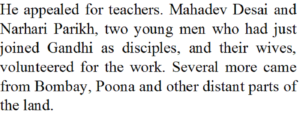

| Word | Meaning |
| Appealed | Requested |
| Disciples | Follower, Learner |
| Volunteered | Offered to do without fees |
He requested teachers to come to Champaran. Mahadev Desai and Nrahari Parikh and their wives came to Champaran. They were followers of Gandhiji. They agreed to do the work without taking any fees. Many more people came from other far parts of the country like Bombay and Poona.


Gandhiji’s youngest son Devadas came from the ashram. Wife of Gandhiji also came. They opened primary schools in six villages. Kasturbai, wife of Gandhiji, taught them about personal cleanliness and how to keep society clean.


| Word | Meaning |
| Miserable | Very bad, Horrible |
Health of people of Champaran was very bad. Gandhiji requested doctors to help residents without any fees. Three medicines were arranged — castor oil, quinine and sulphur ointment.


Anyone whose tongue was of bad colour, was given one type of medicine (castor oil). Those who had malaria were given another set of medicines (quinine and castor oil). Those who had boils on their skin or had other skin problems were given another set of medicines (sulphur ointment and castor oil).
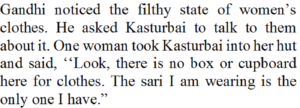

| Word | Meaning |
| Filthy | Very dirty, Very bad |
Gandhiji observed that condition of women’s clothes was very bad. He requested his wife to talk to women about it and do something. One woman told Kasturbai that she did not have any almiraha or box at his hut. She had only one sari which she was wearing.


| Word | Meaning |
| Watch on ashram | Take care of ashram |
| Letters | |
| Financial accounts | Details of expenses and money received |
When Gandhiji stayed at Champaran for long duration he was far from his ashram. Still he was taking care of his ashram also. Regularly he sent his instructions through letters. He also asked them to give details of expenses and money received.


Once, through a letter Gandhiji had asked those living in the ashram to fill the old pit of latrine and to make new pits. He wrote that otherwise the old pits would start giving bad smell.


| Word | Meaning |
| Turning point | Important change |
The event of Champaran was an important change in the life of Gandhiji. He told that he did very simple thing. He declared to the British that they could not order him in his own country.


| Word | Meaning |
| Defiance | Disobedience |
| Alleviate | To reduce |
| Distress | Problem, Sufferings |
The events of Champaran were not started as a disobedience or opposition. These were the attempts to reduce the pain and suffering of poor farmers.


| Word | Meaning |
| Typical | Representative, Regular |
| Intertwined | Mixed |
| Loyalty | Devotion, Faithfulness |
| Abstraction | Nonspecific, Unreal |
This was the regular working method of Gandhiji. Daily practical problems of millions of people were included in his politics. He was not devoted to unreal situations. He was devoted to improving living conditions of human beings.


| Word | Meaning |
| Mould | Make |
Gandhiji tried to make India a new free India. An India that was self-sufficient and hence truly a free country.


| Word | Meaning |
| the English | British, Of England |
| Pacifist | Believer in non-violence |
| Devoted | Faithfull, Staunch |
| Bid farewell | To say goodbye |
| Tour of duty | Official work, Official duty |
Charles Freer Andrew was a strong follower of Gandhiji. He was a British. He did not believe in violence. He was going to Fiji islands for official duty. He came to Champaran to say good bye to Gandhiji.


| Word | Meaning |
| Good idea | Beneficial |
| Vehemently | Strongly |
| Opposed | Objected |
Some of friends of Gandhiji were lawyers. They thought that it would be beneficial if Andrews helped them. Andrews was ready if Gandhiji agreed. But Gandhiji strongly objected to this proposal.
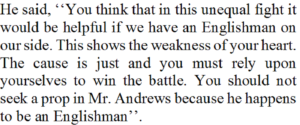

| Word | Meaning |
| Just | True, Justified |
| Rely | Depend |
| Prop | Support |
He asked them if they thought that in the fight among unequal, having an Englishman would be useful. He said that it was weakness of their mental strength. The reason of the fight is true. Therefore we must depend on ourselves to win it. We should not seek support of Mr Andrew because he is a British.


| Word | Meaning |
| Read our minds | Understood our feelings |
| Self-reliance | Self-dependence |
Rajendra Prasad said that Gandhiji had understood their thoughts and feelings correctly. We could not reply to Gandhiji. He had taught us to depend on our own abilities.


In the method adopted by Gandhiji, all the three factors self-reliance, Indian independence and help to sharecroppers were included.
****



0 Comments